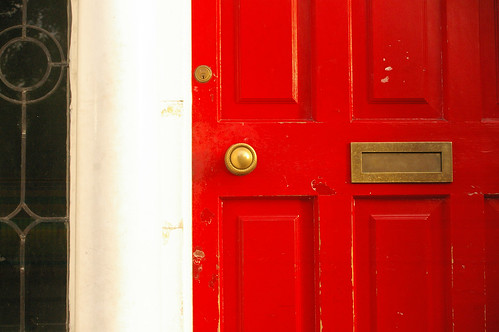Trigger Warning: ABA, ableism, institutionalized child abuse
 [Image Description: A bright red door with a brass knob and a faded mail slit. To its left, there is a long, dark windowpane with some decoration and smudges. The door itself has chips in its paint and markings on it, despite the bright color. It is closed, possibly locked.]
[Image Description: A bright red door with a brass knob and a faded mail slit. To its left, there is a long, dark windowpane with some decoration and smudges. The door itself has chips in its paint and markings on it, despite the bright color. It is closed, possibly locked.]
When I first became an ABA Therapist, I was thrilled. I was actually going to use my psych degree, get paid more than minimum wage, and above all, make a positive difference in Autistic children’s lives. Or at least, that’s what I thought.
Now I look back, and the year I spent working in ABA is my single greatest regret.
When I left, it wasn’t a decision I made overnight. It was a long, difficult process, full of denial and confusion. I don’t enjoy talking about it because I did so many wrong things that affected kids’ lives, and I don’t want to offer any excuses for myself. But I do want you to get a sense of what the process was like, in case anyone reading this happens to be in the same position.
Before I go any further, I want to say that I’m so grateful for the Autistic community for sharing about their lives and their experiences. I’d probably still be working in ABA right now if it wasn’t for their tireless efforts to call out ableism, which helped me recognize it in my own life and in my work. Listening to their voices and their traumatic experiences of ABA is what made me quit, and none of these critiques of ABA are my own. I learned everything from Autistic people, and I’m going to link to many of their writings and videos that influenced my decision to quit.
Since ABA affects Autistic people’s lives first and foremost, their voices are the most important part of this discussion, and it’s essential that you listen to what they’re saying.
And of course, the links in this post are only just a small sample of all the invaluable information that exists within the Autistic community – you can learn so much more by continuing to seek out Autistic writers and speakers. Before you continue reading, I recommend checking out this FAQ page about Autism by Autistic Hoya and this video by Amythest Schaber, because there is already so much misinformation about what Autism even is. And there is no better expert on Autism than someone who actually is Autistic.
I also want to recognize that many forms of therapy for Autistic kids are called “ABA,” but not all would actually be considered traditional ABA and thus they may be less problematic than the forms I’m going to discuss in this post. Many times, a therapy is labeled ABA simply to get covered by insurance. This is why it can get confusing to discuss ABA since the term is used to encompass a broad variety of teaching methods. Please understand that when I’m talking about ABA in this post, I’m speaking from my own personal experience of it. This page is a good summary of the kind of ABA I did (though I never worked at that place specifically), which included Discrete Trial Training (DTT), Natural Environment Training (NET), and errorless teaching.